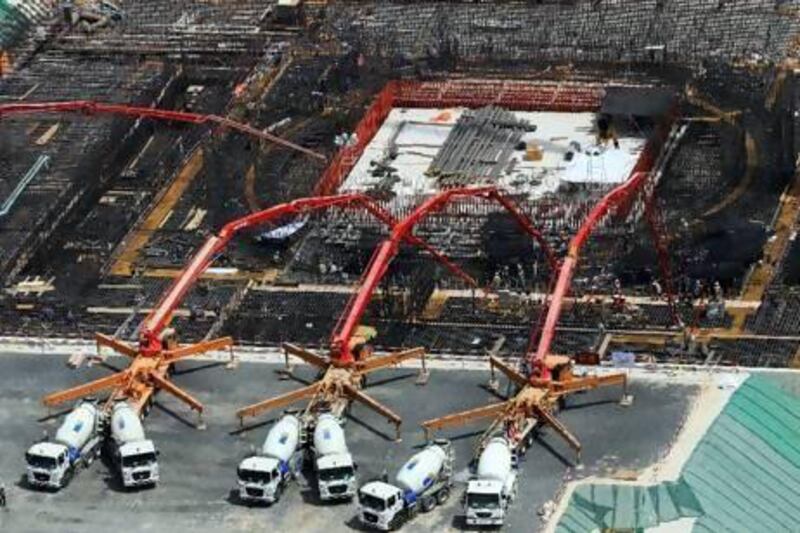ABU DHABI // After five years of research, planning and consultation, the first concrete was poured in July for the Arab world’s first nuclear power plant, setting the UAE on a new stage of development and growth.
When the first nuclear reactor goes on stream in 2017, the UAE will become the first nation to adopt nuclear power since the 1986 Chernobyl disaster. “Our policy from the very beginning stated that the UAE will be committed to the high standards of safety – not only to adopt the safest design, safest plant, but also to focus on developing a culture of safety among workers, among entities, among all the relevant stakeholders,” ambassador Hamad Al Kaabi, the UAE’s permanent representative to the International Atomic Energy Agency in Vienna, said in April.
A central pillar the UAE’s Nuclear Policy is the commitment to build with non-proliferation at its heart, and to forgo domestic enrichment and reprocessing of nuclear fuel – the two parts of the cycle used for in nuclear weapons manufacturing.
This policy established a new model through which non-nuclear states may explore and potentially deploy nuclear energy with the full support and confidence of the international community.
“In 2008 the UAE had its own policy concerning enrichment,” Mr Al Kaabi said this year at the Nuclear Non-Proliferation in the Gulf conference in Doha. “Forgoing this has concluded that the UAE’s programme is peaceful by design. Enrichment makes no sense for the UAE.”
Since 2010, more than 3,500 people have attended forums organised by the Emirates Nuclear Energy Corporation (Enec). Polls there show 77 per cent believe nuclear energy is the best option for the UAE while 92 per cent believe nuclear energy produces electricity safely.
Prior to the Barakah site construction, an 18-month review was conducted by the Federal Authority for Nuclear Regulation (Fanr).
Fanr also worked in close cooperation with the IAEA as well as Enec, which responded to more than 1,600 questions from the regulator.
“The UAE has learnt a serious lesson from the Fukushima disaster [in 2011] and have reported it to the advisory board,” said Hans Blix, head of the International Advisory Board for the UAE’s Nuclear Programme in an interview earlier this year.
“The precautions that are to be taken are against the remote possibility of a tsunami in the Gulf, earthquakes and sea levels in the Gulf and we presented further recommendations on the location of the emergency power generators and communications between government agencies that were adopted”.
In all, the UAE nuclear licence application ran to 9,000 pages reviewed by a team of over 60 experts.
And before the end of this year Enec plans to submit a new construction licence request to build two more reactors at Barakah.
"The UAE has taken the leadership role in the development of a peaceful nuclear energy programme in the GCC," said Mark Hibbs, senior associate of the Carnegie International Endowment for Peace's Nuclear Policy Programme. The country's strategic location and its role as a trade hub has also led to his recommendation of the UAE to join the Nuclear Suppliers Group as the first Arab member, he said.
amustafa@thenational.ae






